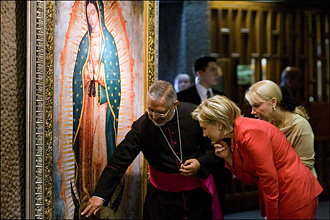
|  |  |  Editorials | Issues | March 2009 Editorials | Issues | March 2009  
Clinton Reassures Mexico About Its Image
 Mark Landler - New York Times Mark Landler - New York Times
go to original


| | In Mexico for diplomatic talks, Secretary of State Hillary Rodham Clinton also visited the Basilica de Guadalupe and its rector, Msgr. Diego Monroy Ponce, in Mexico City on Thursday. (Alfredo Estrella/Agence France-Presse) |  |
Monterrey, Mexico — Secretary of State Hillary Rodham Clinton, continuing her show of solidarity with Mexicans in their struggle against drug trafficking, toured a high-tech police base in Mexico City on Thursday and greeted diplomats from the American Consulate in this northern city, which was sprayed with gunfire last fall by a suspected drug gang member.

But Mrs. Clinton was nearly upstaged by reports that the United States planned to nominate a Cuban-born American diplomat who has written extensively about “failed states” as the next ambassador to Mexico.

The State Department declined to comment on reports that the diplomat, Carlos Pascual, a former ambassador to Ukraine who is currently the director of foreign policy at the Brookings Institution, would be nominated.

But a person familiar with the administration’s deliberations said Mr. Pascual was President Obama’s choice for the post. Mr. Pascual did not respond to an e-mail message asking for comment.

The Mexican daily newspaper El Universal, citing unnamed sources, reported Thursday that the United States had submitted Mr. Pascual’s name to the Mexican government.

The paper noted that Mr. Pascual’s specialty was in dealing with conflict-ridden states. He served as the coordinator for reconstruction and stabilization in the State Department, a post that involved working with several agencies to develop strategies for broken countries like Afghanistan.

That could raise hackles among some Mexicans, who take umbrage at recent assertions by American analysts that drug-related violence has so destabilized Mexico that it is danger of becoming a failed state.

Jorge G. Castañeda, a former Mexican foreign minister, said he was pleased that the administration was reaching outside the pool of Latin American specialists at the State Department. But he said he was concerned that Mr. Pascual did not have close ties to either Mr. Obama or Mrs. Clinton.

On Thursday, Mrs. Clinton noted that no official of the Obama administration had ever used the phrase “failed state.” She said Mexico faced a “public safety challenge,” likening it to the surge of drug violence in American cities in the 1980s. And she lavished praise on the Mexican president, Felipe Calderón, for taking strong measures against the drug cartels.

At the Ixtapalapa police station, Mrs. Clinton was shown two Black Hawk helicopters that the Mexican federal police uses to track drug smugglers. She also watched police squads stage a mock rescue of a hijacked passenger plane.

The Obama administration appears sensitive that the discussion of Mexico’s instability in Washington may have gone too far. Dennis C. Blair, the director of national intelligence, said in testimony in Congress recently that the cartels controlled parts of Mexico, a comment that drew an angry reaction in Mexico.

But on Thursday, he sought to tamp down those fears.

“Mexico is in no danger of becoming a failed state,” Mr. Blair said in a discussion with reporters in Washington. He then repeated the phrase for emphasis.

Speaking to students at a technology university here, Mrs. Clinton also sought to play down a dispute over Mexican trucks’ using American highways, which has set off a trade dispute. Congress canceled financing for a pilot program for the trucks, and Mexico responded by imposing $2.4 billion in tariffs.

Mrs. Clinton said she was confident that the countries would find a solution to the dispute. But she said, “We shouldn’t just take Mexican trucking and act as though that is the only issue.”

A much bigger threat, Mrs. Clinton said, was smuggling across the border. “If there are legitimate questions about how we move goods and services and people, we have to answer all of them,” she said.

Mark Mazzetti contributed reporting from Washington, and Antonio Betancourt from Mexico City. |

 |
|  |



